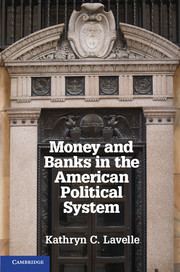Book contents
- Frontmatter
- Contents
- Figures and Tables
- Preface
- Acknowledgments
- Abbreviations
- 1 The Institutional Foundations of Financial Politics in the United States
- Section 1 A Historical Background
- Section 2 Bureaucratic Politics and Finance
- Section 3 The Operation of the Financial Political Economy
- Section 4 Conclusions
- 10 Governing the U.S. Financial System
- Glossary
- References
- Index
- References
10 - Governing the U.S. Financial System
Published online by Cambridge University Press: 05 January 2013
- Frontmatter
- Contents
- Figures and Tables
- Preface
- Acknowledgments
- Abbreviations
- 1 The Institutional Foundations of Financial Politics in the United States
- Section 1 A Historical Background
- Section 2 Bureaucratic Politics and Finance
- Section 3 The Operation of the Financial Political Economy
- Section 4 Conclusions
- 10 Governing the U.S. Financial System
- Glossary
- References
- Index
- References
Summary
The book posed this question: What features of the American political system make the financial system so prone to crises? It has argued that the answer is far more complex than the common themes of large campaign contributions and agency capture by the financial services industry. Although these features of the system play their roles, we have found that a more profound understanding of the three domains of financial politics comes from an examination of the particular historical path the United States took in developing state capacity to regulate finance. Both the political and financial systems reflect an American political culture that distrusts the centralization of power in any one governing institution at either the federal or state level, and that distrusts the concentration of economic power that large banks by their nature hold. Thus the system is prone to crises because an overarching integrated monetary, fiscal, and regulatory solution at the state, national, and international levels would contract core American values concerning the separation of powers, federalism, and free market capitalism. The flip side is that as the system developed, it generated innovations that gave a diverse population and industries growing access to credit.
Policymaking in the financial area is thus destined to be a victim of its own success. If the regulatory system is working properly, market participants and the interest groups that represent them in the political system question why regulation is even necessary. Regulation appears to stunt growth and stifle innovation for no apparent reason. Interest groups are particularly incapable of organizing to protect themselves from dangers that might have arisen since the last set of regulations were written because they have no direct experience with which to understand such threats. Even if they organized to protect themselves, they would have to cover an immensely intricate and diffuse system that preserves competition among agencies. Thus interest groups do not organize to protect the benefits of a stable system. They organize to take advantage of what they see as opportunities to make a profit. The system of pluralist interest group representation, distorted by the size and resources of the industry, guarantees that change is a constant feature of the system.
- Type
- Chapter
- Information
- Money and Banks in the American Political System , pp. 249 - 268Publisher: Cambridge University PressPrint publication year: 2013



